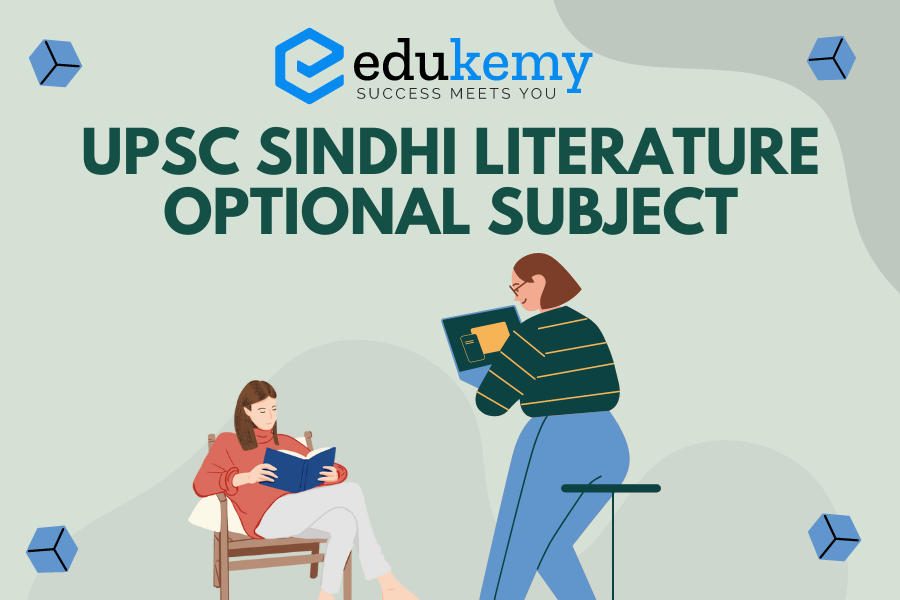
The UPSC Civil Services Examination offers Sindhi Literature as an optional subject, inviting candidates to delve into the rich tapestry of a vibrant language. This syllabus unveils a captivating journey through Sindhi’s literary landscape, encompassing everything from the ancient roots of the language itself to the powerful works of contemporary Sindhi authors. By delving into poetry, prose, and the social context that shaped them, aspirants gain a profound understanding of Sindhi culture and its enduring legacy.
Contents
- 1 Sindhi Paper 1
- 2 Sindhi Paper 2
- 3 FAQs on Sindhi Literature Optional Subject – UPSC
- 3.1 1. Is Sindhi Literature a good choice for the UPSC Optional Subject?
- 3.2 2. What topics are covered in the Sindhi Literature Optional Subject?
- 3.3 3. What are the resources available for preparing for the Sindhi Literature Optional Subject?
- 3.4 4. How can I improve my chances of scoring well in Sindhi Literature Optional?
- 3.5 5. Are there any coaching institutes that specialize in Sindhi Literature for UPSC?
- 4 In case you still have your doubts, contact us on 9811333901.
Sindhi Paper 1
Section – A
- (a) Origin and evolution of Sindhi language—views of different scholars.
(b) Significant linguistic features of Sindhi language, including those pertaining to its phonology, morphology and syntax.
(c) Major dialects of the Sindhi language.
(d) Sindhi vocabulary—stages of its growth, including those in the pre-partition and post-partition periods.
(e) Historical study of various Writing Systems (Scripts) of Sindhi.
(f) Changesin the structure of Sindhi language in India, after partition, due to influence of other languages and social conditions.
Section – B
- Sindhi literature through the ages in context of socio-cultural conditions in the respective periods :
(a) Early medieval literature upto 1350 A.D. including folk literature.
(b) Late medieval period from 1350 A.D. to 1850 A.D.
(c) Renaissance period from 1850 A.D. to 1947 A.D.
(d) Modern period from 1947 and onwards.
(Literary genres in Modern Sindhi literature andexperiments in poetry, drama, novel, short story, essay, literary criticism, biography, autobiography, memoirs and travelogues.)

Sindhi Paper 2
Section – A
References to context and critical appreciation of the texts included in this section.
(1) Poetry
a. ‘‘Shah Jo Choond Shair’’ : ed. H.I. Sadarangani, Published by Sahitya Akademi (First 100 pages).
b. ‘‘Sachal Jo Choond Kalam’’ : ed. Kalyan B. Advani Published by Sahitya Akademi (Kafis only).
c. ‘‘Sami-a-ja Choond Sloka’’ : ed. B.H. Nagrani Published by Sahitya Akademi (First 100 pages).
d. ‘‘Shair-e-Bewas’’ : by Kishinchand Bewas(“Saamoondi Sipoon’’ portion only).
e. ‘‘Roshan Chhanvro’’ : Narayan Shyam.
f. ‘‘Virhange Khapoi je Sindhi Shair jee Choond’’ : ed. H.I. Sadarangani, published by Sahitya Akademi.
(2)Drama
g. ‘‘Behtareen Sindhi Natak’’ (One-act Plays) : Edited by M. Kamal Published by Gujarat Sindhi Academy.
h. ‘‘Kako Kaloomal’’ (Full-length Play ) : by Madan Jumani.
Section – B
References to context and critical appreciation of the texts included in this section.
a. ‘Pakheeara Valar Khan Vichhrya’ (Novel) : by Gobind Malhi.
b. ‘Sat Deenhan’ (Novel) : by Krishin Khatwani.
c. ‘Choond Sindhi Kahanyoon’ (Short Stories) Vol. III. : Edited by Prem Prakash, published by Sahitya Akademi.
d. ‘Bandhan’ (Short Stories) : Sundari Uttamchandani.
e. ‘Behtareen Sindhi Mazmoon’ (Essays): Edited by Hiro Thakur, published by Gujarat Sindhi Academi.
f. ‘Sindhi Tanqeed’ (Criticism) : Edited by Harish Vaswani : Published by Sahitya Akademi.
g. ‘Mumhinjee Hayati-a-ja Sona Ropa varqa’ (Autobiography) : by Popati Hiranandani.
h. ‘‘Dr. Choithram Gidwani’’ (Biography) : by Vishnu Sharma.
FAQs on Sindhi Literature Optional Subject – UPSC
1. Is Sindhi Literature a good choice for the UPSC Optional Subject?
Choosing an Optional Subject depends on your personal strengths and interests. Sindhi Literature can be a good choice if you:
- Are fluent in Sindhi and have a strong understanding of its literary heritage.
- Enjoy reading and analyzing literature.
- Are comfortable with memorizing important dates, authors, and works.
However, Sindhi Literature might be less ideal if you don’t have a strong foundation in the language or find literary analysis challenging.
2. What topics are covered in the Sindhi Literature Optional Subject?
The syllabus for the Sindhi Literature Optional Subject is vast and covers various aspects of Sindhi literature, including:
- History and development of Sindhi language and literature
- Different genres like poetry, prose, drama
- Major literary movements and trends
- Important Sindhi authors and their works
- Cultural and social context reflected in Sindhi literature
3. What are the resources available for preparing for the Sindhi Literature Optional Subject?
While limited compared to some other languages, resources for Sindhi Literature preparation include:
- UPSC Syllabus and Previous Years’ Papers (https://upsc.gov.in/examinations/previous-question-papers)
- Sindhi Sahitya Akademi publications (https://sahitya-akademi.gov.in/)
- Textbooks and research papers on Sindhi literature (available in libraries or online)
4. How can I improve my chances of scoring well in Sindhi Literature Optional?
- Develop fluency in reading, writing, and understanding Sindhi.
- Build a strong foundation in Sindhi literary history and major figures.
- Practice writing analytical essays on Sindhi literary works.
- Solve previous years’ UPSC question papers to understand the exam format and marking scheme.
5. Are there any coaching institutes that specialize in Sindhi Literature for UPSC?
The availability of coaching institutes specializing in Sindhi Literature might be limited. However, you can explore coaching institutes offering Sindhi language courses or general UPSC Optional Subject guidance. Additionally, online resources and self-study can be effective with proper planning.
In case you still have your doubts, contact us on 9811333901.
For UPSC Prelims Resources, Click here
For Daily Updates and Study Material:
Join our Telegram Channel – Edukemy for IAS
- 1. Learn through Videos – here
- 2. Be Exam Ready by Practicing Daily MCQs – here
- 3. Daily Newsletter – Get all your Current Affairs Covered – here
- 4. Mains Answer Writing Practice – here

